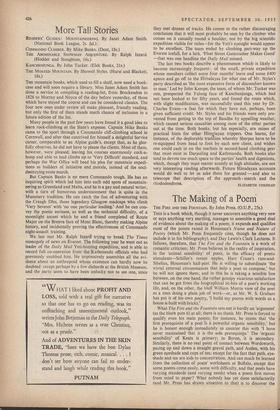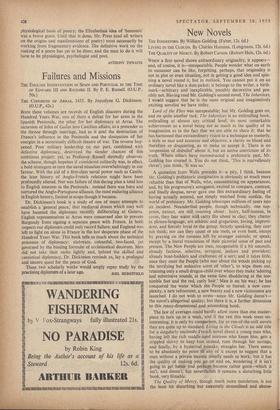The Making of a Poem
THE FIRE AND THE FOUNTAIN. By John Press. (0.U.P., 25s.) THIS is a book which, though it never uncovers anything very new or says anything very startling, manages to assemble a good deal of evidence about the making of a poem; it expands and qualifies most of the points raised in Housman's Name and Nature of Poetry (which Mr. Press frequently cites, though he does not include it in his bibliography), and Day Lewis's Clark Lectures. It follows, therefore, that The Fire and the Fountain is a work of romantic criticism; Mr. Press believes in the reality of inspiration, in the 'animal sensibility' of poets, in the efficacy of poetic stimulants—Schiller's rotten apples, Hart Crane's rum-and- Sibelius, Housman's half-pint. He is willing to subordinate 'the trivial external circumstances that help a poet to compose,' but he will not ignore them; and in this he is taking a sensible line between, on the one hand, the rather gossipy vicarious satisfaction that can be got from the biographical tit-bits of a poet's working life, and, on the other, the bluff William Morris view of the poet as a man doing a plain job of work—or, as Mr. W. S. Graham has put it of his own poetry, 'I build my poems with words as a house is built with bricks.'
What The Fire and the Fountain sets out is hardly an 'argument' (as the blurb puts it) at all; there is no thesis. Mr. Press is forced to qualify even his main points; for instance, he insists that 'the first prerequisite of a poet is a powerful organic sensibility,' but he is honest enough immediately to counter this with 'I have never maintained that it is the sole prerequisite.' The 'organic sensibility' of Keats is primary; in Byron, it is secondary. Similarly, there is no real point of contact between Wordsworth, pacing up and down a straight gravel path, and Auden, with his green e.yeshade and cups of tea; except for the fact that path, eye- shade and tea are aids to concentration. And can much be learned from the collection of poets' worksheets at Buffalo, except that some poems come easily, some with difficulty, and that poets have varying standards (and varying needs) when a poem first moves from mind to paper? What nobody has yet done satisfactorily (and Mr. Press has drawn attention to this) is to discover the physiological basis of poetry; the Elizabethan idea of 'humours' was a brave guess. Until that is done, Mr. Press (and all writers on the origins and manifestations of poetry) must necessarily be working from fragmentary evidence. The definitive work on the making of a poem has yet to be dOne; and the man to dolt will have to be physiologist, psychologist and poet.
ANTHONY THWAITE



































 Previous page
Previous page